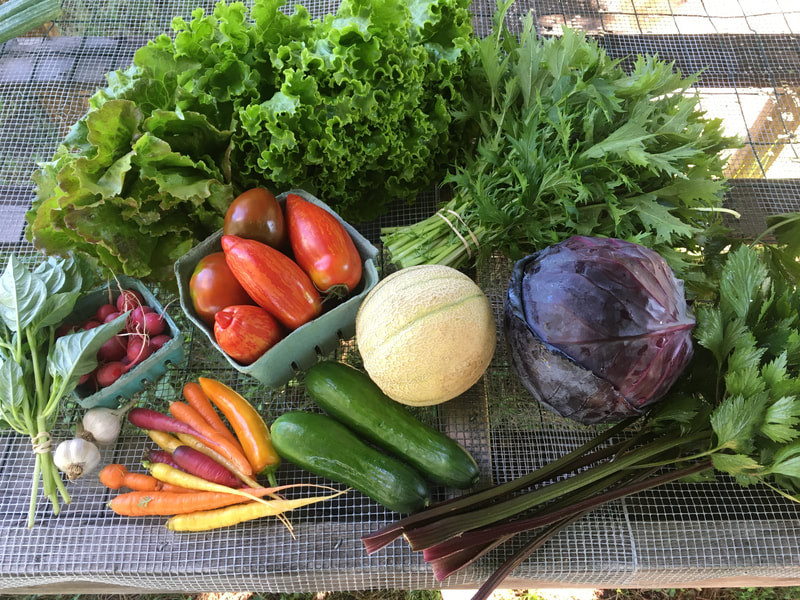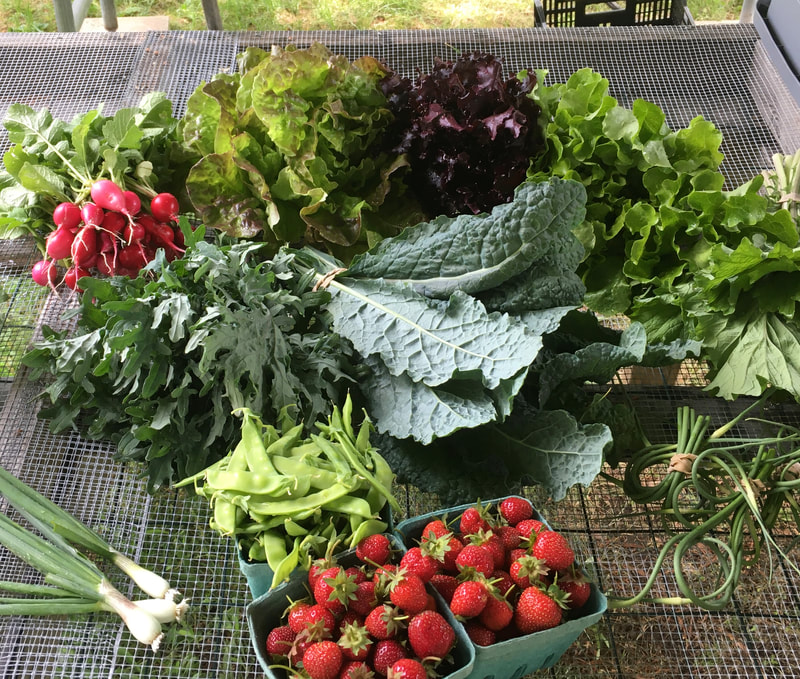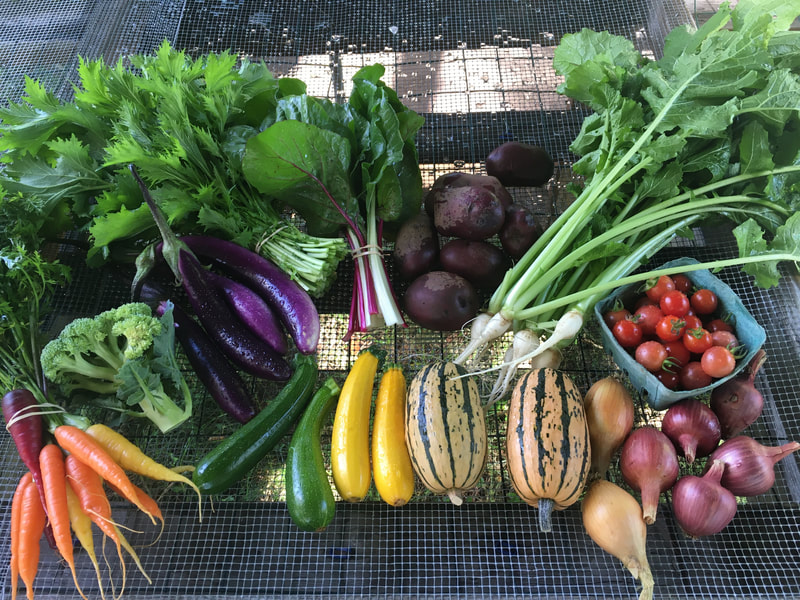What is a CSA?
CSA stands for Community Supported Agriculture. A CSA works by people paying upfront for a share of the upcoming season, and each week during the growing season the share consists of a variety of fruit and vegetables that are ready to be harvested. This system benefits the farmer by providing funds at a time when there are a lot of expenses for seeds and materials, but little revenue. As a CSA member you are also agreeing to take on any risks of the coming season. Depending on weather and other variables certain crops do better in some seasons than others. The 2021 growing season was cool and wet which was great for lettuce, but tomatoes suffered a little. In a hot dry year greens might have a harder time, but tomatoes would do excellent. Benefits to the members include locally grown (in our case organic) fruits and vegetables at a discounted price. It will encourage you to try some new vegetables and learn what is really in season each week.
What does an Uphill Farm CSA look like?
For 2024 the CSA season will be 18 weeks starting mid June - mid October. The exact start date will be weather dependent but we will be aiming for June 10th.
The cost is $550 which works out to about $30 a week. We aim for members to receive about 15% more than market value, so you can expect to get around $34 worth of fruits and vegetables each week. This will depend on the season and may vary week to week.
Examples of what we grow: strawberries, blueberries, tomatoes, peppers, carrots, beets, radishes, broccoli, cabbage, zucchini, summer squash, winter squash, onions, shallots, garlic, cucumbers, melons, peas, eggplant, head lettuce, kale, mustard greens, swiss chard, string beans, potatoes, turnips, kohlrabi, celeriac, and herbs.
Some things we don't grow: corn and baby greens. Corn takes up more field space than we currently have available. Baby greens require specific harvesting, washing, and packing infrastructure to make them possible, which I don't currently have. I highly recommend purchasing a small salad spinner if you don't have one already. Heads of lettuce can easily be cut, put in the spinner, washed, and then stored in the fridge in the spinner; they can last weeks this way.
The season will start with more of the cool weather crops such as greens, peas, radishes, and strawberries, but will be dominated by greens and partly dictated by weather. Each week as the season progresses more vegetables become available. An example of a share from August 12, 2022: 1 bunch of carrots, some Romano beans, a red onion, a sweet onion, eggplant, sweet peppers, tomatoes, head of garlic, head of lettuce, bunch of swiss chard, and a cucumber.
Depending on your exact location I offer home delivery to folks in the Randolph/Gorham area. If people in Berlin are interested I will look into a pickup option for you in the Gorham area. Pick up on the farm will also be an option. Delivery will be Monday afternoons, more exact time TBD. If you are not able to be home when I deliver I ask that you provide a cooler for me to leave your share in. I am not responsible for your share once it has been delivered.
I am attempting to not use plastic bags on my farm, I feel there are enough out in the world already. I will deliver the share in paper bags or cardboard boxes, so you should have some ways to store your produce either in plastic bags you already have or there are many cloth bag options available now. As I mentioned above I highly recommend a salad spinner for lettuce and other greens.
Space is limited so for more information, or to sign up, please email us at [email protected].
The cost is $550 which works out to about $30 a week. We aim for members to receive about 15% more than market value, so you can expect to get around $34 worth of fruits and vegetables each week. This will depend on the season and may vary week to week.
Examples of what we grow: strawberries, blueberries, tomatoes, peppers, carrots, beets, radishes, broccoli, cabbage, zucchini, summer squash, winter squash, onions, shallots, garlic, cucumbers, melons, peas, eggplant, head lettuce, kale, mustard greens, swiss chard, string beans, potatoes, turnips, kohlrabi, celeriac, and herbs.
Some things we don't grow: corn and baby greens. Corn takes up more field space than we currently have available. Baby greens require specific harvesting, washing, and packing infrastructure to make them possible, which I don't currently have. I highly recommend purchasing a small salad spinner if you don't have one already. Heads of lettuce can easily be cut, put in the spinner, washed, and then stored in the fridge in the spinner; they can last weeks this way.
The season will start with more of the cool weather crops such as greens, peas, radishes, and strawberries, but will be dominated by greens and partly dictated by weather. Each week as the season progresses more vegetables become available. An example of a share from August 12, 2022: 1 bunch of carrots, some Romano beans, a red onion, a sweet onion, eggplant, sweet peppers, tomatoes, head of garlic, head of lettuce, bunch of swiss chard, and a cucumber.
Depending on your exact location I offer home delivery to folks in the Randolph/Gorham area. If people in Berlin are interested I will look into a pickup option for you in the Gorham area. Pick up on the farm will also be an option. Delivery will be Monday afternoons, more exact time TBD. If you are not able to be home when I deliver I ask that you provide a cooler for me to leave your share in. I am not responsible for your share once it has been delivered.
I am attempting to not use plastic bags on my farm, I feel there are enough out in the world already. I will deliver the share in paper bags or cardboard boxes, so you should have some ways to store your produce either in plastic bags you already have or there are many cloth bag options available now. As I mentioned above I highly recommend a salad spinner for lettuce and other greens.
Space is limited so for more information, or to sign up, please email us at [email protected].



